Meeting Richard Nixon

If Watergate didn’t happen, would America now have universal health care? Maybe — yes (thanks to Richard Nixon).
Thirty-eight years ago tonight, President Richard Nixon resigned from the most powerful job in the world.
August 9, 1974, was a muggy night in Washington, fitting for the national tragedy that was the final tortured two years of Richard Nixon’s doomed presidency.
The world knew what Nixon was going to say on television that incredible night — announcing he’d become the first (and only) president in history to resign from office. But until we actually watched it for ourselves, until we witnessed it, until we heard the President tearfully utter the fateful words, “I shall resign the presidency,” no one really contemplated the full force of gravity that was the tragedy and sorrow of that memorable night.
I was 12 when I watched Nixon’s resignation live on television. The whole country froze. It was like a giant stopwatch had been clicked. During the entire spring leading up to that fateful night, in school classrooms we watched the Senate committee hearings on Watergate, which were carried live on all three major networks. This was long before cable television, so we knew what was going on politically in this country, since that was all that was shown. Moreover, we had a common perspective on events. And what grand theater it was — the nation’s first real reality show, with an astounding cast of characters, entwined in the gravest of controversies.
By the summer of 1974, most of America mistrusted Nixon — even many Republicans. His job approval ratings hit an all-time low of 18 percent. The resignation was inevitable.
Nixon was a divisive figure, to be sure, and very much remains so. He’s arguably the most vilified American political leader of the 20th Century by those on the left, and in the judgment of many.
Yet behind his frequent disregard for the constitution during the cover-up and crisis, and the crimes which eventually became known as the Watergate scandal, here was a highly-accomplished man of tremendous intellect and great potential. Indeed, he very well might have gone down as the greatest LIBERAL since FDR, had his executive agenda not been diverted by the massive cover-up and all-consuming series of events that led to his downfall.
Richard Nixon once famously said, “I worked for everything I got.”
He was correct.
Nixon was entirely a self-made man. He overcame numerous personal hardships that would have made a political career impossible for anyone less determined to succeed. He rose up from lower-middle-class roots. He was the first in his family to attend college. In fact, he graduated from Duke University, working his way through school, while the rich kids had it far easier. He also lacked the sparkle and charisma that became increasingly vital during the television age — which very likely cost him the election in his first bid for the presidency.
Nixon served in World War II, where he was stationed on several Pacific islands. He earned his law degree and then won a seat in Congress. That was the launch of a career that would come to dominate the American political landscape over the next 25 years. Incredibly, just six years after his first election victory, he became Vice President of the United States and just a heartbeat away from the most powerful job on earth.
Nixon had his share of ups and downs. He won four major elections (Vice President twice, and President twice), but also lost three brutal election battles – when he ran for the Senate, the 1962 California Governor’s race, and of course — the 1960 presidential election to John F. Kennedy.
Nixon’s 1968 presidential victory marked an astounding personal and political comeback. However, when he took office in January 1969, he inherited a terribly divided nation with serious problems. There were riots in most major cities. Vietnam War protests created chaos on many campuses. Half a million troops were locked down in Vietnam, with dozens coming back in body bags each day. Energy prices were about to skyrocket.
While Nixon remains widely associated with the neoconservative movement, due in part to pragmatically adopting the so-called “Southern Strategy” in order to win the 1968 and 1972 elections, he was anything but a conservative as president. In fact, he was a liberal. A leftist. A progressive.
The record is irrefutable, certainly on his domestic agenda. Consider President Nixon’s bold list of progressive initiatives between 1969 and 1974:
— Withdrew American forces from Vietnam (yes, it took much longer than necessary, but the U.S. troop count went from 500,000 to negligible by 1973)…and yes, Nixon should have been tried as a criminal for his meddling in the Paris Peace Talks in the fall of 1968, undermining Lyndon Johnson’s secret initiatives.
— Signed the first S.A.L.T. talks with the former Soviet Union, dramatically reducing the number of nuclear weapons (widely criticized by right-wingers and the military-industrial complex who were making obscene profits from the Cold War)
— Recognized the Peoples Republic of China for the first time, ending a 23-year stalemate of having no diplomatic relations with the world’s most populous nation.
— Dramatically increased salaries for federal employees
— Implemented integration of public schools (largely through busing — creating a violent backlash among conservatives)
— Instituted “Wage and Price Controls” in an effort to slow down the rate of inflation (about as anti-Free Market a policy as there is)
— Created Supplemental Security Income (SSI), which gave early Social Security payments to the disabled
— Gave 18-year-olds the right to vote (although this was a judicial initiative, the 26th Amendment was passed during Nixon’s presidency)
— Created the Environmental Protection Agency (EPA)
— Created the Occupational Safety and Health Administration (OSHA)
— Created the National Oceanic and Atmospheric Administration (NOAA)
— Passed the Clean Air and Water Act (perhaps the most effective anti-pollution measure in history)
— Expanded funding for the National Endowment for the Arts and National Endowment for the Humanities
— Appointed three Supreme Court Justices (the Roe v. Wade decision came during Nixon’s presidency — all three appointees voted in favor of Roe)
— Proposed legislation to require oil companies to disclose information about reserves, operating costs, and profits (never reached the floor on either house)
President Nixon proposed and instigated many other progressive programs and initiatives, as well. This is a partial list. But the real kicker is health care and the swamp of deceit that has surrounded this issue to this day, which could have been SOLVED back during Nixon’s time had he been able to complete his term and pass a single-payer system.
Consider what President Nixon proposed in a special message to Congress (February 1974). Try to imagine these words being spoken by our current (so-called “leftist”) president, who lacks any political willpower to fight for a single-payer nationalized health care system. Once again, it’s hard to fathom, but President Richard Nixon out forth this proposal before Congress and the nation:
One of the most cherished goals of our democracy is to assure every American an equal opportunity to lead a full and productive life.
In the last quarter-century, we have made remarkable progress toward that goal, opening the doors to millions of our fellow countrymen who were seeking equal opportunities in education, jobs, and voting.
Now it is time that we move forward again in still another critical area: health care.
Without adequate health care, no one can make full use of his or her talents and opportunities. It is thus just as important that economic, racial and social barriers not stand in the way of good health care as it is to eliminate those barriers to a good education and a good job.
Three years ago, I proposed a major health insurance program to Congress, seeking to guarantee adequate financing of health care on a nationwide basis. That proposal generated widespread discussion and useful debate. But no legislation reached my desk.
Today the need is even more pressing because of the higher costs of medical care. Efforts to control medical costs under the New Economic Policy have been Inept with encouraging success, sharply reducing the rate of inflation for health care. Nevertheless, the overall cost of health care has still risen by more than 20 percent in the last two and one-half years, so more and more Americans face staggering bills when they receive medical help today….
….These gaps in health protection can have tragic consequences. They can cause people to delay seeking medical attention until it is too late. Then a medical crisis ensues, followed by huge medical bills–or worse. Delays in treatment can end in death or lifelong disability.
COMPREHENSIVE HEALTH INSURANCE PLAN (CHIP)
Early last year, I directed the Secretary of Health, Education, and Welfare to prepare a new and improved plan for comprehensive health insurance. That plan, as I indicated in my State of the Union message, has been developed and I am presenting it to the Congress today. I urge its enactment as soon as possible.
SEE FULL TEXT AND PROGRAM HERE
A strong case could be made that it would be difficult to win the Democratic Party presidential nomination supporting these initiatives, let alone having any shot whatsoever within the Republican Party. After all, can you imagine ANY REPUBLICAN supporting what Nixon proposed? Confronted with this record, even leftist stalwart Noam Chomsky once concluded, “Richard Nixon was our last liberal president.”
I met and spoke with Richard Nixon once, in 1985. That was about 11 years after he resigned from the presidency.
He’s almost always characterized by writers and historians as a cold and calculating man, even by those who were closest to him, which is certainly borne out by the considerable archival material now available on the Nixon Administration. No doubt, Nixon had a mean streak.
But I found Nixon to be beyond gracious. He was downright cordial. With me at the time, I had my own two copies of books Nixon had written – Six Crisis and RN: The Memoirs of Richard Nixon which he willingly autographed for me. When some photos were taken following the social affair, he personally called me out from a group of people standing off to the side.
As Nixon was posing with others, he asked, “Where’s the young man with my books?” Instantly, I darted out of the crowd and posed for the photo seen here, with Nixon’s arm around my right shoulder. Like two pals.
Nixon mentioned to me that he was impressed I had brought along his first book in particular, written back in 1962 – coincidentally, the year of my birth. No doubt, there aren’t many copies of Six Crisis around anymore, even less that are personally inscribed.
But looking back on everything now, his career, his presidency, and the all-too-brief one-hour encounter with the late president in a room full of people, I am convinced that Nixon was a lonely man. I do not expect this view to garner much sympathy from those who rightfully despised him. But he will always be a tragic figure in my mind.
Yes, Nixon was very much a Shakespearean tragedy — a sort of modern King Lear plagued by demons and ultimately overcome by self-destructive tendencies.
Yet, it’s not just Nixon who lost managed to lose everything when his presidency ended so abruptly on this night, 38 years ago.
In a sense, we — you and I and every American — are the real losers, robbed of countless opportunities for continued progress and advancement, including a universal health care system.
Indeed, in the end — we all became the victims of Richard Nixon’s downfall.




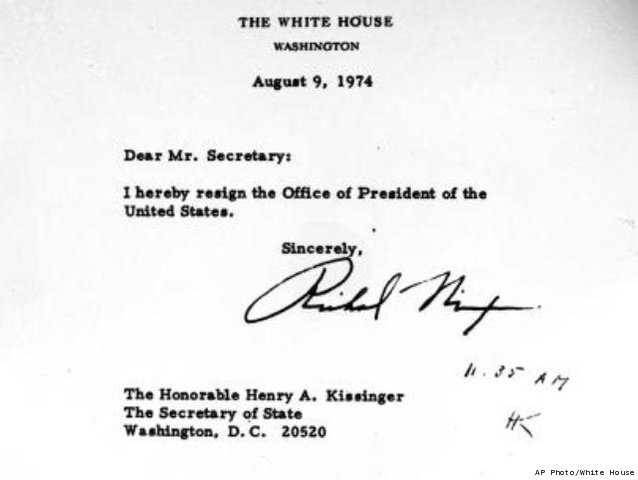
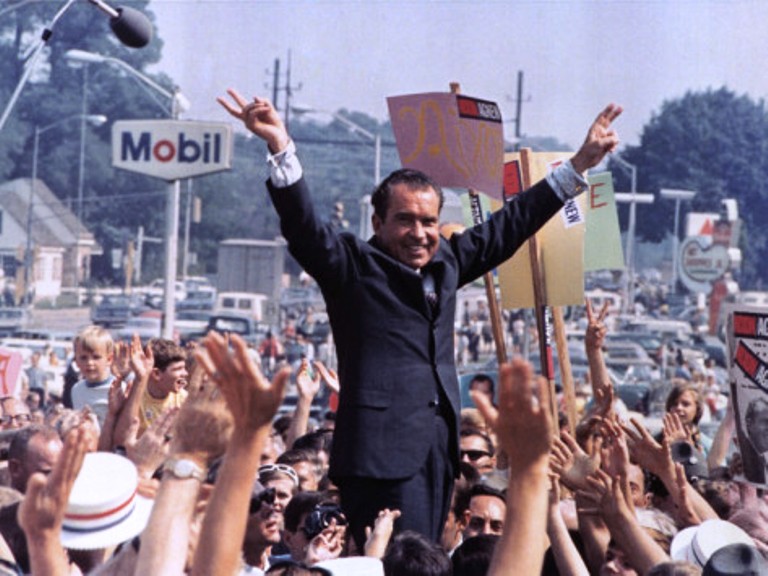
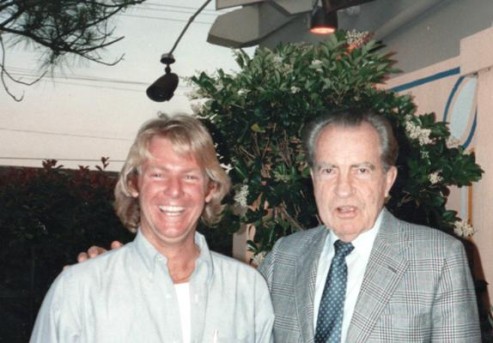
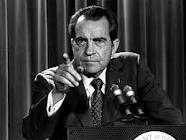








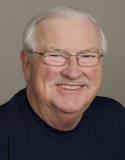
Nolan,
I enjoyed reading this, especially since my only source of opinion about RMN from a liberal’s perspective was coming from Hunter S. Thompson’s books and articles.
Benjo
Thanks for writing and contributing your thoughts, Benjo. I am honored that you would visit. My objective is to challenge many conventional ideas we have in politics and in life. In many cases, our perceptions are not justified by facts. I believe the LBJ, Obama, and Nixon columns this week somewhat reveal this. Obliged for your feedback.
— Nolan
I always thought Nixon was the bad guy until I read Forty Years War. Between that and finding out things like him proposing universal health care, his environmental record, etc… I think his resignation was a tragic event. That’s not to say he was always a perfect human being but compared to some of his successors, he doesn’t seem so bad. Maybe I’m crazy, but I think that what a lot of people want today is Richard Nixon (pre-Watergate mind you). Someone who is tough and can relate to the working class but someone who moves society forward. No other president in history got a bigger bump between the first and second presidential elections and given what he walked into, that is an impressive feat.